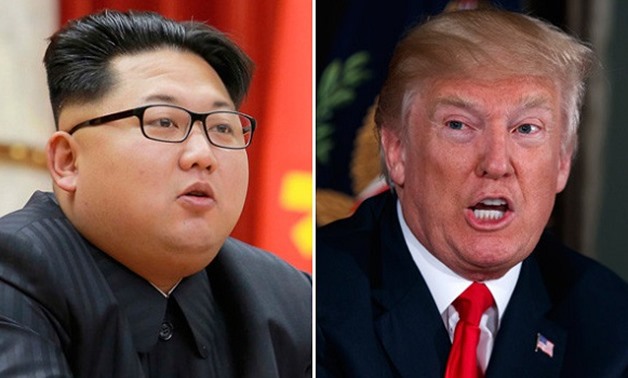
U.S. seeks to expedite aid for N.Korea amid stalled nuclear talks - FILE
SEOUL - 19 December 2018: U.S. officials will try to expedite humanitarian aid to North Korea, a U.S. envoy said on Wednesday, as Washington and Pyongyang struggle to find a breakthrough in stalled talks aimed at ending the North's nuclear programme.
Stephen Biegun, the U.S. special representative for North Korea, made the announcement as he arrived in Seoul for four days of talks with South Korean officials.
North Korean leader Kim Jong Un vowed to work towards denuclearisation at his landmark summit with U.S. President Donald Trump in Singapore in June but the two sides have since made little progress.
With Washington doubling down on sanctions enforcement, humanitarian aid for North Korea has nearly ground to a halt this year, despite warnings of a potential food crisis and improving relations with Pyongyang, aid groups say.
International sanctions imposed over North Korea's nuclear weapons and missile programmes technically do not cover humanitarian activities, and over the summer the United Nations adopted a U.S. proposal designed to streamline approval for aid shipments.
But strict interpretations of U.N. sanctions curtailing banking and shipping transactions with Pyongyang, as well as a travel ban for U.S. citizens, have effectively shut down the North Korea operations of most relief groups, according to a dozen officials at U.N. agencies and civilian organisations.
"I'll be sitting down with American aid groups early in the new year to discuss how we can better ensure the delivery of appropriate assistance, particularly through the course of the coming winter," Biegun told reporters in Seoul, noting that the United States would work with the United Nations in reviewing how it grants sanctions exemptions for aid.
He acknowledged that the travel ban - which requires American aid workers to obtain special permission from the U.S. State Department before travelling to North Korea - "may have impacted the delivery of humanitarian assistance".
Early next year, U.S. officials will review how they grant that permission for the "purposes of facilitating the delivery of aid", Biegun said.
Part of the catalyst for the review was the expulsion of an American citizen who had illegally entered North Korea in October, he said.
North Korea handled the man's case "expeditiously and with great discretion", giving American officials "greater confidence about the safety and security of Americans travelling" to North Korea, Biegun said.
STALLED TALKS
Biegun's visit to Seoul comes as negotiations between the United States and North Korea appear stalled, with the two sides yet to reschedule talks between U.S. Secretary of State Mike Pompeo and senior North Korean official Kim Yong Chol after abruptly cancelling a meeting in November.
Trump has said a second summit with Kim is likely to take place in January or February, though he wrote on Twitter last week that he is "in no hurry".
North Korea has for years pursued nuclear and missile programmes in defiance of U.N. Security Council resolutions but the bellicose rhetoric from both Pyongyang and Trump that raised fears of war has eased this year.
The stalled negotiations have also had an impact on inter-Korean ties, with the North aloof towards the South's plan to host Kim Jong Un in Seoul this month as agreed at his summit with President Moon Jae-in in Pyongyang in September.
Kim's trip was unlikely to take place this year, Moon's press secretary said last week.
South Korean Unification Minister Cho Myoung-gyon, who is due to meet Biegun on Friday, said the nuclear talks would face a critical moment between February and March.
"I think it is fair to say that the denuclearisation process is not yet on track in earnest," Cho was quoted by the Yonhap news agency as telling reporters.
"Next year, we can see whether they will have a chance to get closer to the objectives."
North Korean state media has credited Trump for his "willingness" to continue dialogue but has also slammed Washington for stepping up sanctions, accusing the State Department of being "bent on bringing the DPRK-U.S. relations back to the status of last year which was marked by exchanges of fire".
The report referred to the North by its official name, the Democratic People's Republic of Korea (DPRK).
The State Department said communication between both sides was "ongoing" but sanctions relief would come after they achieved the goal of a "final, fully verified denuclearisation".
"The sooner North Korea denuclearises, the sooner sanctions can be lifted," deputy spokesman Robert Palladino told a news briefing on Tuesday in Washington.
Biegun was scheduled to hold talks on Thursday with his South Korean counterpart, Lee Do-hoon, ahead of their session on Friday of a working group launched last month to boost coordination on North Korean policy.
Biegun is expected to discuss inter-Korean issues with Cho amid U.S. concerns that Seoul may be moving too quickly with Pyongyang relative to the lacklustre progress on denuclearisation.
The two Koreas plan to hold a ground-breaking ceremony on Wednesday for their project to reconnect rail and road links, which would need U.S. sanctions exemptions.

Comments
Leave a Comment